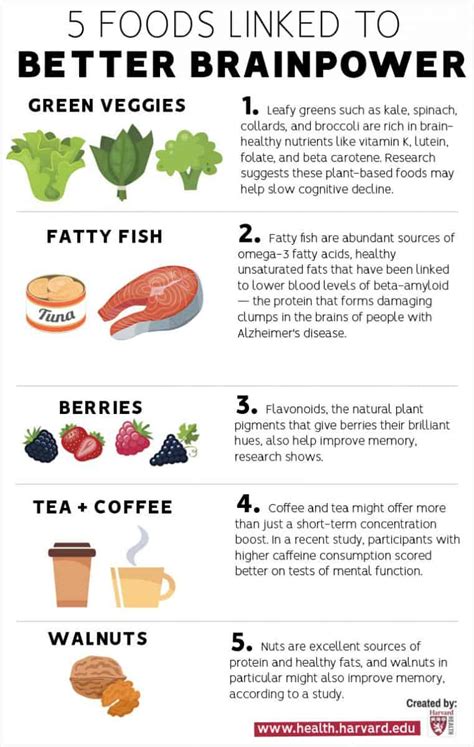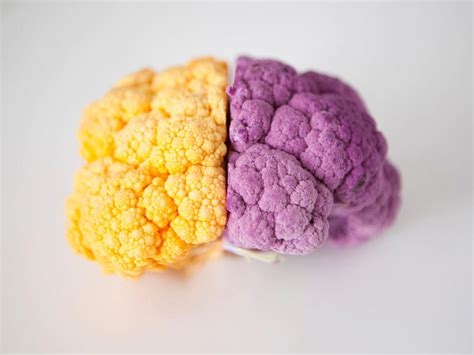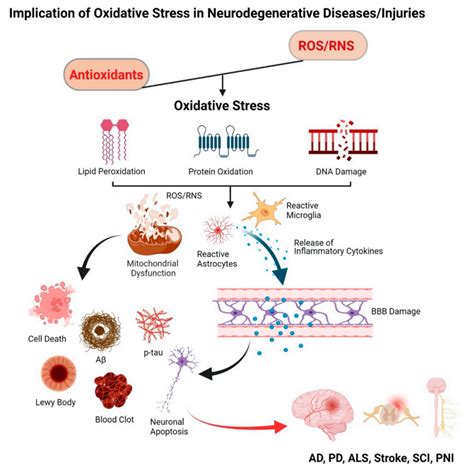In our fast-paced society, it is easy to overlook the impact that our dietary choices have on the functionality of our most vital organ: the brain. The way we nourish ourselves not only influences our physical well-being but also plays a crucial role in optimizing our cognitive abilities. By embracing a balanced and wholesome eating plan, individuals can empower themselves to unlock their brain's full potential.
Aptly fueling our bodies through a well-balanced diet ensures that our brain is armed with the essential nutrients and compounds it requires to perform at its peak. Rather than solely focusing on calorie intake, a nutritious eating plan prioritizes the quality of the food we consume. By incorporating a wide range of nutrient-dense foods, individuals can ensure they are equipping their brain with the necessary building blocks to operate efficiently.
Ample scientific evidence highlights the close relationship between our dietary choices and our brain health. Consuming an array of wholesome foods has been shown to improve cognitive function, enhance memory retention, and boost overall brain performance. A diet rich in antioxidants, healthy fats, vitamins, and minerals acts as a safeguard against oxidative stress and inflammation, which are known to impair brain function and increase the risk of cognitive decline.
Nourishing Your Brain: How a Wholesome Eating Plan Enhances Cognitive Function

Maintaining a well-balanced and nutritious eating regimen can significantly contribute to promoting optimal brain functionality and sharpening mental acuity. A mindful choice of food and an understanding of its impact on cognitive health can play a crucial role in nourishing and cultivating a sharp mind.
Evidence suggests that consuming a diverse range of nutrient-dense foods rich in essential vitamins, minerals, and antioxidants is essential for supporting brain health. By incorporating a colorful array of fruits, vegetables, whole grains, lean proteins, and healthy fats into your diet, you provide your brain with the vital fuel it needs to function efficiently and excel in cognitive tasks.
Fueling Your Cognitive Power:
The consumption of omega-3 fatty acids, found abundantly in fatty fish, nuts, and seeds, has been linked to enhanced cognitive performance and the prevention of age-related cognitive decline. These essential fats play a crucial role in brain cell development, communication, and overall brain health.
Boosting Brain Function with Antioxidants:
Antioxidant-rich foods, such as blueberries, spinach, kale, and dark chocolate, can aid in reducing oxidative stress and inflammation in the brain, thereby safeguarding against cognitive decline and boosting memory and attention span.
Micro and Macronutrients for Mental Agility:
Adequate intake of B vitamins, like folate, vitamin B12, and vitamin B6, derived from sources like leafy greens, legumes, eggs, and lean meats, is crucial for maintaining healthy brain function. These vitamins support the production of neurotransmitters, ensuring efficient communication between brain cells.
In addition, consuming sufficient amounts of iron, zinc, magnesium, and other essential minerals supports the development, repair, and maintenance of brain cells, ultimately aiding in optimal cognitive performance.
The Gut-Brain Connection:
Emerging research indicates a strong correlation between the health of the gut and brain function. Including probiotic-rich foods like yogurt, kefir, and sauerkraut in your diet can promote a healthy gut microbiome, optimizing the production of neurotransmitters and influencing cognitive processes, such as memory, learning, and mood regulation.
In conclusion, adopting a nourishing eating plan with a variety of nutrient-rich foods, including omega-3 fatty acids, antioxidants, vitamins, and minerals, can fortify your brain's vitality and enhance cognitive function. By choosing wisely and embracing a balanced diet, you can empower your mind, promoting long-term brain health and an enduring cognitive edge.
Fueling the Mind: How Nutrition Impacts Brain Health
Enhancing cognitive function and maintaining optimal brain health requires more than just a basic understanding of healthy eating habits. By examining the profound impact of nutrition on the mind, we can unravel the intricate relationship between our dietary choices and brain function. This section aims to delve into the fascinating world of how fueling our bodies with the right nutrients can contribute to a flourishing mind.
Nutrients for Thought: The Power of a Balanced Diet in Cognitive Function

Achieving optimal cognitive function relies heavily on the consumption of a well-rounded and diverse selection of nutrients. A balanced diet not only nourishes the body, but also directly influences the functioning of the mind. By providing the brain with the essential building blocks and energy it needs to thrive, a nutritious diet can significantly enhance cognitive abilities, memory, focus, and overall brain health.
The Fuel for Brain Power
The human brain is an intricate and energy-intensive organ that requires a constant supply of nutrients to support its functions. Just as a car needs the right type of fuel to perform at its best, the brain relies on specific nutrients to operate efficiently. These essential nutrients serve as the raw materials for neurotransmitters, which are responsible for transmitting signals between brain cells. A balanced diet rich in these nutrients provides the necessary fuel for optimal cognitive function and information processing.
Eating for Memory and Learning
Memory and learning are foundational aspects of cognitive function, and they are greatly influenced by the foods we consume. Certain nutrients play a crucial role in the formation and maintenance of memory, while others aid in learning and cognitive development. Antioxidants found in fruits and vegetables protect brain cells from oxidative stress, supporting memory and preventing cognitive decline. Omega-3 fatty acids, commonly found in oily fish, contribute to brain cell structure and function, enhancing learning capabilities and promoting neuroplasticity.
Fueling Focus and Mental Clarity
Maintaining focus and mental clarity are paramount for optimal brain function. Nutrients that support these aspects of cognitive function include vitamins and minerals such as B vitamins, vitamin D, and magnesium. B vitamins play a crucial role in the production and regulation of neurotransmitters that contribute to focus and attention. Vitamin D, often referred to as the "sunshine vitamin," supports brain health and reduces the risk of cognitive decline. Magnesium helps calm the mind and promotes relaxation, enabling improved focus and mental clarity.
The Gut-Brain Connection
It is not just the brain itself that benefits from a balanced diet; the gut-brain connection is an essential factor in cognitive function. The gut and the brain communicate bidirectionally, with the microbiota in the gut playing a significant role in brain health. Consuming a diverse range of plant-based foods and fermented products enhances gut health, promoting a healthy microbiota. This, in turn, positively influences cognitive function, mood, and overall brain well-being.
A balanced diet, rich in essential nutrients, is an invaluable asset for optimal cognitive function. It provides the brain with the necessary fuel, aids in memory and learning, enhances focus and mental clarity, and supports the symbiotic relationship between the gut and the brain. By understanding the power of a balanced diet in cognitive function, individuals can make informed choices to nourish their brains and unlock their fullest potential.
The Brain-Food Connection: How Your Dietary Choices Impact Cognitive Performance
When it comes to optimizing mental performance, one cannot underestimate the significance of the intricate relationship between the food we consume and the functionality of our brain. The connection between what we eat and how well our brains perform is undeniable, with scientific research consistently highlighting the profound impact dietary choices have on cognitive function. By making conscious decisions regarding our nutritional intake, we have the ability to enhance our mental capabilities and overall brain health.
1. Fueling Brainpower with Nutrient-rich Foods: One of the key aspects of the brain-food connection lies in the importance of nourishing our brains with essential nutrients. Just as a car requires fuel to run efficiently, our brains require specific nutrients to function optimally. Incorporating a variety of fruits, vegetables, whole grains, lean proteins, and healthy fats into our diets can provide us with the vital nutrients, such as antioxidants, omega-3 fatty acids, vitamins, and minerals, necessary for promoting optimal brain function.
2. The Role of Antioxidants in Enhancing Cognitive Abilities: Antioxidants play a crucial role in protecting our brain cells from oxidative stress and minimizing the risk of cognitive decline. Foods rich in antioxidants, such as berries, dark chocolate, leafy greens, and nuts, can help combat inflammation and oxidative damage, ultimately supporting long-term brain health and cognitive performance.
3. The Influence of Omega-3 Fatty Acids on Brain Function: Omega-3 fatty acids, commonly found in fatty fish like salmon, mackerel, and sardines, as well as walnuts and flaxseeds, have been extensively studied for their positive impact on brain health. These essential fats contribute to the structure and functionality of brain cells, supporting memory, concentration, and overall cognitive function. Including sources of omega-3 fatty acids in our diets can help optimize brain performance and potentially reduce the risk of age-related cognitive decline.
4. The Gut-Brain Axis and Its Implications for Mental Well-being: A growing body of research suggests that the gut microbiota, the collection of microorganisms residing in our digestive system, plays a crucial role in influencing brain function and mental well-being. Consuming a diet rich in probiotics and prebiotics, found in fermented foods, yogurt, kefir, and fiber-rich foods, can help nurture a healthy gut microbiome, thereby benefiting cognitive function and emotional stability.
5. Understanding the Impact of Processed Foods on Cognitive Abilities: As we delve into the brain-food connection, it is crucial to address the negative consequences of processed foods on cognitive abilities. Highly processed foods, often abundant in refined sugars, unhealthy fats, artificial additives, and preservatives, have been linked to poor cognitive performance, memory problems, and an increased risk of mental health disorders. By reducing the consumption of processed foods and opting for whole, unprocessed alternatives, we can safeguard our brain health and optimize mental performance.
- Conclusion: The brain-food connection underscores the importance of mindful dietary choices in supporting optimal brain function and cognitive performance. By fueling our bodies with nutrient-rich foods, embracing antioxidants and omega-3 fatty acids, nurturing a healthy gut-brain axis, and minimizing the consumption of processed foods, we can take proactive steps towards enhancing our mental capabilities for long-term brain health and overall well-being.
Enhancing Cognitive Abilities: Memory Boosters in Your Diet

When it comes to optimizing our brain's overall performance and cognitive abilities, the food we consume plays a critical role. Certain foods have been found to effectively enhance memory, improve focus, and boost overall mental clarity. In this section, we will explore a variety of memory boosters that can be easily incorporated into your daily diet.
1. BlueberriesBlueberries, often referred to as "brain berries," are packed with antioxidants that help protect the brain from oxidative stress and reduce inflammation. Studies have shown that the consumption of blueberries can improve memory and enhance overall cognitive function. |
2. Fatty FishFatty fish, such as salmon, trout, and sardines, are excellent sources of omega-3 fatty acids. These essential fats are crucial for brain health, as they play a vital role in building cell membranes and promoting communication between brain cells. Including fatty fish in your diet can improve memory and decrease the risk of age-related cognitive decline. |
3. TurmericTurmeric, a vibrant yellow spice commonly used in curry, contains a compound called curcumin. Curcumin has been found to cross the blood-brain barrier and has anti-inflammatory and antioxidant properties. Regular consumption of turmeric may enhance memory, improve mood, and protect against age-related brain diseases. |
4. Dark ChocolateIndulging in some dark chocolate with high cocoa content can provide numerous brain-boosting benefits. Dark chocolate is rich in flavonoids, which have been associated with improved blood flow to the brain, enhanced cognitive function, and increased attention span. However, it is important to consume dark chocolate in moderation due to its calorie content. |
5. Green TeaGreen tea is not only a refreshing beverage but also a great memory booster. It contains caffeine and an amino acid called L-theanine, which work together to improve brain function. The combination of these compounds can enhance focus, alertness, and overall cognitive performance. |
By including these memory boosters in your diet, you can support and enhance your brain's cognitive abilities. Remember to enjoy a varied and balanced diet along with regular physical exercise to optimize your overall brain health and function.
Building Blocks for Brain Health: Essential Nutrients for Optimal Cognitive Function
In order to promote and enhance cognitive function, it is crucial to understand the significance of providing the brain with the necessary building blocks it needs to perform at its best.
The foundation for optimal brain health lies in the consumption of essential nutrients that nourish and support cognitive function. By incorporating these vital elements into our diets, we can lay the groundwork for improved cognitive abilities, memory retention, and overall brain performance.
Food for Thought: The Role of Antioxidants in Safeguarding Neural Cells

In the realm of brain health, it is crucial to delve into the realm of nutrition and explore the impact of antioxidants on the preservation of neuronal cells. Antioxidants serve as a shield, guarding against the detrimental effects of oxidative stress, which impairs optimal brain function and can lead to cognitive decline. By neutralizing harmful free radicals and preventing their detrimental effects on brain health, antioxidants play a vital role in maintaining the vitality and longevity of neural cells.
One notable category of antioxidants that exhibits a powerful impact on brain health is polyphenols. These plant-derived compounds possess extraordinary antioxidant properties, effectively scavenging free radicals and reducing inflammation in the brain. Found abundantly in colorful fruits, vegetables, and herbs, polyphenols offer a natural defense system against oxidative damage, thereby facilitating a healthy and flourishing environment for brain cells.
- Moreover, vitamins C and E are essential antioxidants that contribute significantly to the protection of brain cells. Vitamin C, commonly found in citrus fruits, berries, and leafy greens, helps regenerate brain cells and counteracts the harmful effects of oxidative stress. On the other hand, vitamin E, abundant in nuts, seeds, and vegetable oils, functions as a potent antioxidant, safeguarding the delicate neural tissues from damage caused by free radicals.
- The mighty presence of antioxidants extends beyond vitamins, as the mineral selenium also plays a crucial role in protecting brain cells. By promoting the activity of antioxidant enzymes, selenium enhances the brain's defense against oxidative stress. Optimal levels of selenium can be obtained from sources such as brazil nuts, seafood, and whole grains.
- Antioxidant-rich foods, such as berries, dark chocolate, and green tea, have been linked to improved brain function and a reduced risk of neurodegenerative diseases like Alzheimer's and Parkinson's. The vibrant pigments found in berries, known as anthocyanins, possess potent antioxidant and anti-inflammatory properties that help shield brain cells from damage and promote cognitive function.
In conclusion, the inclusion of antioxidant-rich foods in one's diet can have a profound impact on brain health and function. These vital compounds act as guardians, protecting neural cells from oxidative stress and reducing the risk of cognitive decline. By incorporating a variety of colorful fruits, vegetables, nuts, and seeds into our diet, we provide our brains with the necessary tools to thrive and maintain optimal functionality throughout life.
Beyond IQ: Enhancing Your Brain's Processing Speed Through Nourishing Nutrition
When it comes to optimizing cognitive abilities, many individuals focus solely on the concept of intelligence quotient (IQ). However, there is an often overlooked factor that plays a significant role in the brain's processing speed beyond just IQ – nutrition. The food we consume can profoundly impact our brain's functionality, influencing the speed at which it processes information, problem-solving abilities, and overall cognitive performance.
Eating a well-balanced diet that includes a variety of nutrient-rich foods can have a remarkable impact on brain health and function. Certain nutrients, such as omega-3 fatty acids, antioxidants, and vitamins, directly support the growth and development of brain cells, enhancing their ability to communicate efficiently and effectively. By fueling our bodies with the right nutrients, we can supercharge our brain's processing speed and maximize our cognitive potential.
- Omega-3 fatty acids: Found in fatty fish, flaxseeds, and walnuts, these essential fats help build and repair brain cells, boosting their overall communication speed.
- Antioxidants: Abundant in colorful fruits and vegetables, antioxidants protect brain cells from oxidative stress, ensuring optimal functioning and information processing.
- Vitamins: Specific vitamins, such as B vitamins found in whole grains and leafy greens, play a crucial role in maintaining a healthy nervous system, supporting efficient neurotransmitter production, and enhancing brain processing speed.
In contrast, a diet high in processed foods, refined sugars, and unhealthy fats can have detrimental effects on the brain's processing speed. These foods can lead to inflammation, insulin resistance, and other metabolic impairments, ultimately slowing down cognitive functions and compromising overall brain health.
It is important to note that while a healthy diet can positively impact brain function, it should be complemented with other lifestyle factors such as regular exercise, quality sleep, and mental stimulation. By adopting a holistic approach that encompasses nutrition and various lifestyle choices, individuals can unlock their brain's full potential and achieve optimal cognitive performance.
Brain on the Menu: Top Foods for Concentration and Focus

In this section, we will explore the essential role of nutrition in enhancing mental clarity, cognitive performance, and sustained attention without specifically mentioning the significance of a healthy diet for optimal brain function. By carefully selecting the right foods, we can provide our brains with the necessary fuel to maintain concentration and maximize focus throughout the day.
Fuel your Focus with Omega-3 Fatty Acids: Including omega-3 fatty acids in your diet is crucial for improving cognitive functions such as memory, attention, and problem-solving abilities. These healthy fats are found in abundance in foods like fatty fish (such as salmon and sardines), walnuts, chia seeds, and flaxseeds. Incorporating these foods into your meals can enhance your brain's ability to concentrate and stay sharp.
Power Up with Antioxidant-Rich Berries: Berries are packed with antioxidants that help reduce inflammation and oxidative stress, which can impair brain function. Blueberries, strawberries, and blackberries are particularly rich in these compounds. Enjoying a handful of berries as a snack or adding them to your breakfast cereal can provide you with the mental clarity and focus you need to tackle the day's challenges.
Keep Your Brain Hydrated with Water: Staying adequately hydrated is vital for optimal brain function. Dehydration can lead to fatigue, decreased cognitive abilities, and difficulty concentrating. Remember to drink enough water throughout the day to keep your brain hydrated and maintain peak performance.
Boost Concentration with Dark Chocolate: Indulging in a small amount of dark chocolate can help improve focus and attention. Dark chocolate contains flavonoids and caffeine, which stimulate blood flow to the brain, promoting mental alertness. Opt for dark chocolate with a high cocoa content for maximum benefits.
Get Your Brain-Friendly Nutrients from Leafy Greens: Leafy greens, such as spinach, kale, and broccoli, are rich in essential nutrients like vitamins A, C, and K, as well as folate and iron. These nutrients support proper brain function and enhance concentration and focus. Including a variety of leafy greens in your meals can provide you with the necessary nutrients to optimize your cognitive abilities.
Conclusion: By incorporating these brain-boosting foods into your diet, you can nourish your brain and improve concentration and focus. A well-rounded approach to nutrition can help you unlock your cognitive potential and maintain mental clarity throughout the day.
Mind Your Diet: How Poor Nutrition Negatively Affects Brain Function
When it comes to the well-being of our brain, the quality of our nutrition plays a crucial role. Our eating habits not only impact our physical health but also have a direct influence on the functioning of our brain. In this section, we will explore the detrimental effects of improper dietary choices and the importance of nourishing our minds through a balanced and nutrient-rich diet.
FAQ
Why is a healthy diet important for brain function?
A healthy diet is important for brain function because the brain requires a constant supply of nutrients to function optimally. Nutrients such as omega-3 fatty acids, antioxidants, vitamins, and minerals play a crucial role in promoting brain health and supporting cognitive functions.
Which nutrients are essential for optimal brain function?
Several nutrients are essential for optimal brain function. Omega-3 fatty acids, found in fatty fish, walnuts, and flaxseeds, help improve cognitive function and reduce the risk of cognitive decline. Antioxidants, present in fruits and vegetables, protect the brain from oxidative stress. B vitamins, found in whole grains and leafy greens, help in energy production and neurotransmitter synthesis. Additionally, minerals like iron and zinc are also important for brain health.
How does a healthy diet impact memory and learning?
A healthy diet positively impacts memory and learning. Certain nutrients, such as antioxidants and omega-3 fatty acids, have been found to enhance memory and cognitive abilities. A diet rich in fruits, vegetables, whole grains, and lean proteins provides the necessary nutrients to support brain health and improve memory and learning abilities.
Can a poor diet affect brain function?
Yes, a poor diet can negatively affect brain function. Consuming a diet high in processed foods, added sugars, and unhealthy fats can lead to inflammation and oxidative stress in the brain, impairing cognitive function. A lack of essential nutrients can also result in deficiencies, which can impact memory, concentration, and overall brain health.
Are there any specific diets that are particularly beneficial for brain function?
While there is no one-size-fits-all diet for optimal brain function, some diets have shown benefits. The Mediterranean diet, for example, is rich in fruits, vegetables, whole grains, fish, and healthy fats like olive oil. This diet has been associated with a lower risk of cognitive decline and improved brain health. The DASH (Dietary Approaches to Stop Hypertension) diet, which focuses on fruits, vegetables, lean proteins, and low-fat dairy, has also been linked to better cognitive function.



